Key takeaways:
- Culinary certifications provide essential credibility and open doors for aspiring chefs, highlighting their commitment and skills in the industry.
- Current trends in culinary education emphasize sustainability, technology, and the development of soft skills, essential for modern kitchen dynamics.
- Popular certifications like Certified Sous Chef (CSC) and Certified Executive Chef (CEC) signify not only culinary mastery but also leadership abilities in kitchen management.
- The future of culinary certifications will likely focus on online learning opportunities, sustainability practices, and the importance of interpersonal skills in professional kitchens.
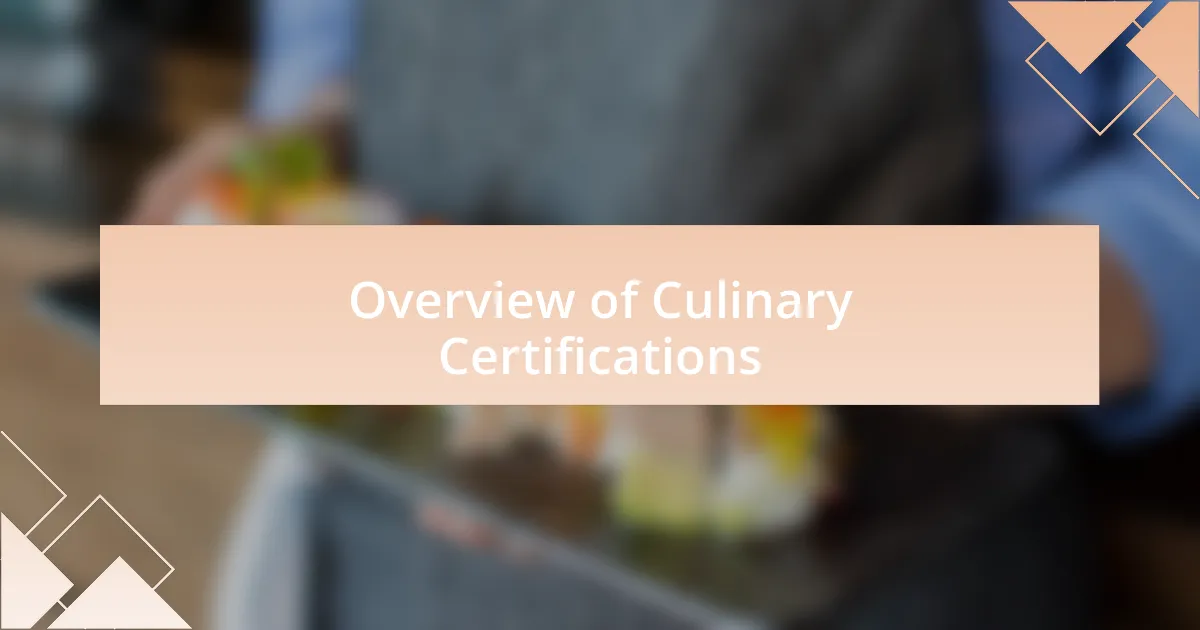
Overview of Culinary Certifications
Culinary certifications serve as a critical stepping stone for aspiring chefs and culinary professionals. They not only showcase skill proficiency but also demonstrate a commitment to the craft. I recall my early days in the kitchen, where the idea of earning a certification felt like a badge of honor, fueling my passion and ambition.
As I navigated through various programs, I learned that certifications vary widely—from foundational courses to advanced specializations. Each has its own set of requirements and prestige. Have you ever wondered which certification holds the most weight in the industry? Personally, I’ve found that while some certifications like the Certified Executive Chef (CEC) carry significant prestige, others can open unique doors tailored to niche culinary paths.
It’s fascinating to see how these certifications evolve with culinary trends. For instance, growing interest in plant-based cuisine has paved the way for specialized programs, reflecting shifts in consumer preferences. I often think about how these trends influence not just chefs but also the dining experiences we create, reminding me that staying current is vital in this ever-changing field.
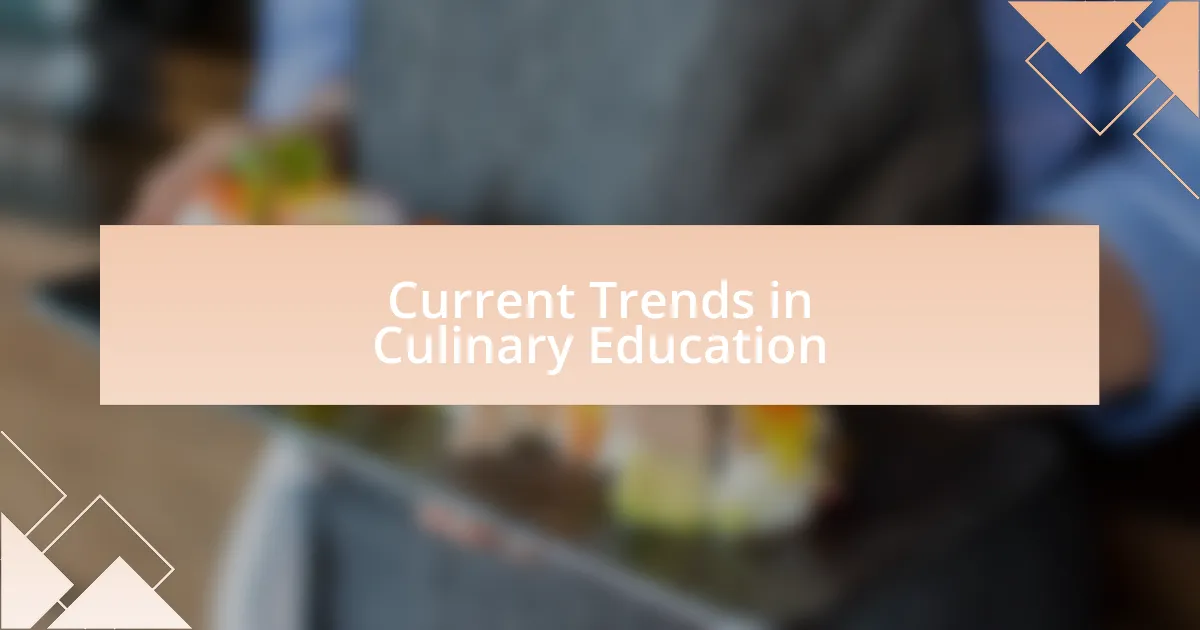
Current Trends in Culinary Education
In recent years, a marked shift towards sustainability has surfaced in culinary education. Programs are increasingly integrating sustainable practices, teaching students not just to cook but also to respect food sources and the environment. I remember a workshop where we foraged ingredients; it was enlightening to witness how nature provides us with so much, and it deepened my appreciation for using every part of an ingredient.
Moreover, there’s a strong emphasis on technology in the kitchen today. With the advent of smart kitchens and food tech innovations, culinary programs are adapting their curricula to reflect this change. I often think back to when I first learned about sous-vide techniques, which were once considered avant-garde. Now, it’s commonplace, showcasing how essential it is for us, as educators and chefs, to embrace technology to improve our culinary creations and enhance efficiency.
Culinary schools are also starting to place a heavier focus on soft skills like leadership and communication. The kitchen isn’t just about cooking; it’s about teamwork and collaboration. I vividly remember a class where we participated in team-building exercises, which surprisingly translated really well into actual kitchen environments. How often do we stop to think about the dynamics of a kitchen team? Building these skills can be the difference between a good chef and a great one.
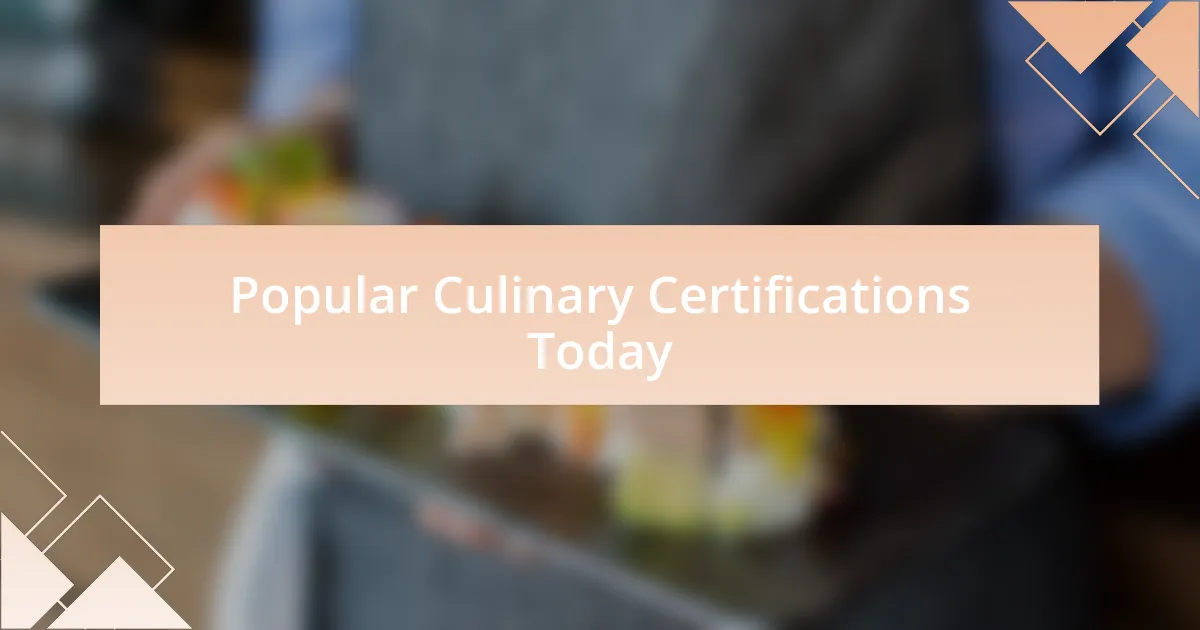
Popular Culinary Certifications Today
As I delve into the world of popular culinary certifications today, I find the Certified Sous Chef (CSC) credential consistently stands out. This certification not only enhances a chef’s technical skills but also validates their commitment to excellence in the kitchen. I remember how that piece of paper felt when I received it; it wasn’t just a credential but a symbol of my hard work and dedication to my craft.
Another noteworthy certification is the Certified Executive Chef (CEC), which is ideal for those aspiring to lead in high-end kitchens. Earning this title signifies much more than mastering cooking techniques; it reflects a deep understanding of kitchen management and leadership. When I pursued this certification, I felt a mixture of pride and anxiety, realizing I was stepping up to a role that required not just culinary prowess but also the ability to inspire a team.
Finally, the Certified Master Chef (CMC) represents the pinnacle of culinary achievement for many chefs. It’s not for the faint of heart; the extensive exam demands both skill and creativity under pressure. I’ve witnessed peers pour their heart and soul into the preparation, often staying up late practicing their dishes. Isn’t that what makes this journey so rewarding? Each of these certifications carries weight, opening doors while shaping the future of aspiring culinary professionals.
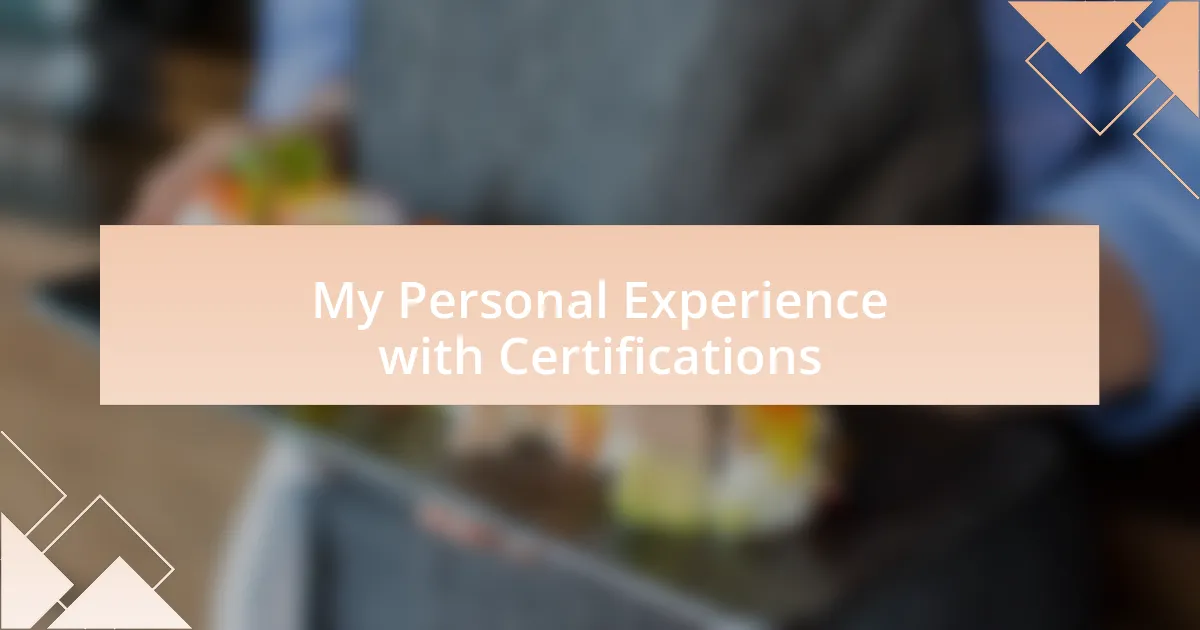
My Personal Experience with Certifications
When I first considered culinary certifications, I felt both excitement and apprehension. I remember sitting in front of my laptop, scrolling through endless reviews and testimonials. It was a pivotal moment—what if this certification could really change my career? I decided to take the plunge with the Certified Sous Chef (CSC) program, and it was one of the best decisions I’ve ever made.
In the midst of rigorous training, I found my passion for cooking truly reigniting. The hands-on workshops pushed me to refine my technique, while the theoretical components deepened my understanding of culinary art. I can still recall the exhilaration I felt when I prepared my final exam dish; all my hard work was leading up to that moment. Did I ever doubt myself? Of course, but each challenge was met with perseverance that only made the victory sweeter.
Looking back, my pursuit of the Certified Executive Chef (CEC) designation was transformative. It wasn’t just about enhancing my skills; it was about personal growth and learning to lead a kitchen team effectively. I often reflect on how those late nights studying management theories shaped my understanding of the culinary world beyond the stove. Did I ever imagine I’d run a kitchen one day? Absolutely not, but each certification helped me believe in my potential.
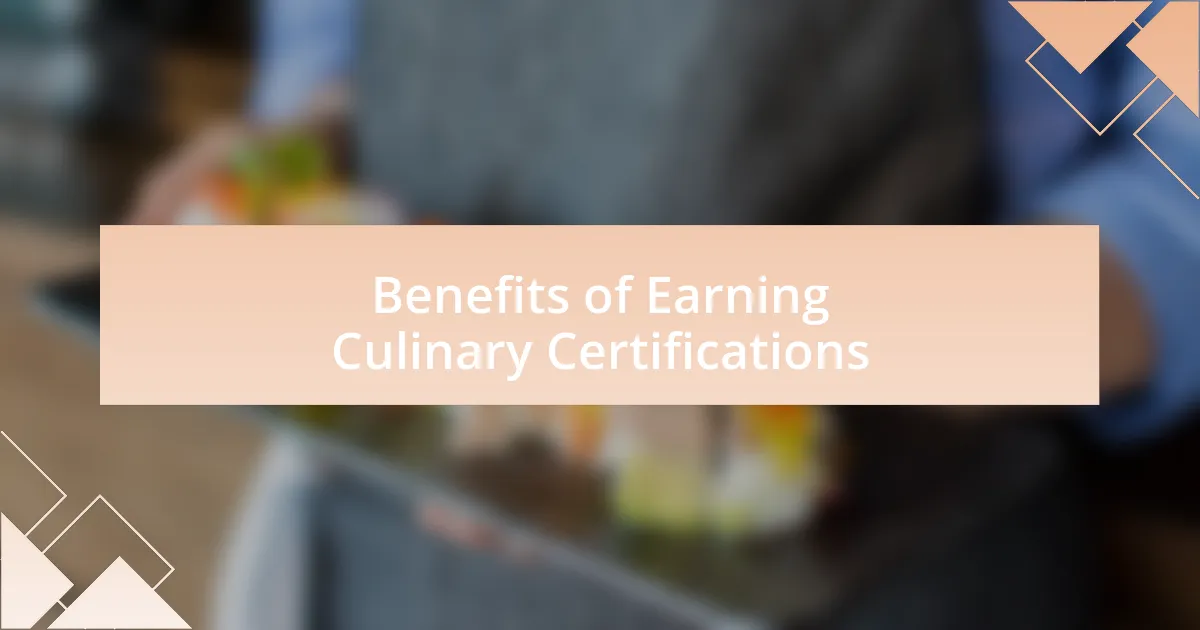
Benefits of Earning Culinary Certifications
Earning culinary certifications can elevate your career in ways you might not initially foresee. I still remember the sense of pride and confidence I felt when I earned my Specialty Pastry Certification. It wasn’t just a piece of paper; it opened doors to job opportunities in high-end bakeries that I once thought were out of reach. Have you ever wondered how a simple certification can change the trajectory of your career? I can assure you, it can!
Moreover, certifications provide a structured path to mastering diverse culinary techniques. During my time in the Culinary Arts certification program, I was introduced to cuisines I had never explored before. Each new dish challenged my creativity and broadened my perspective. Isn’t it fascinating how learning can be both formal and fun? Those experiences helped me break out of my comfort zone and discover my unique culinary voice.
I’ve found that certifications also foster a sense of community among aspiring chefs. When I attended certification courses, I met passionate individuals who became lifelong friends and collaborators. There’s something incredibly motivating about sharing your culinary journey with others. It leads me to ask—wouldn’t you want to be part of a supportive network that thrives on shared knowledge and experiences? In my experience, building these connections has been as valuable as the skills I acquired.
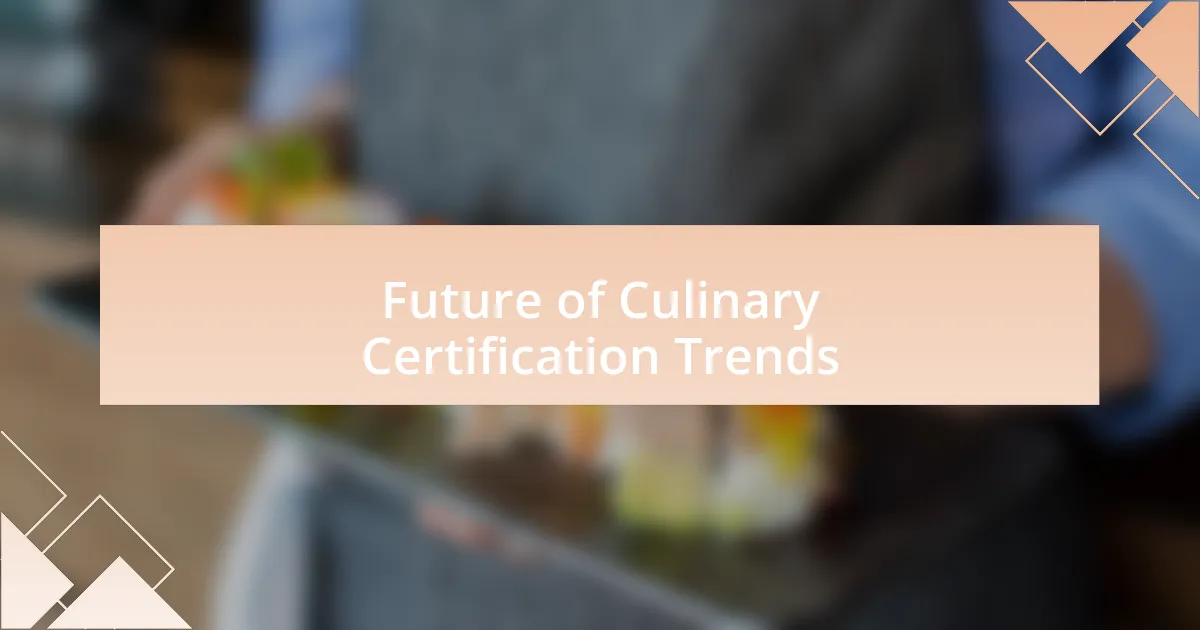
Future of Culinary Certification Trends
As we look ahead, I believe culinary certification trends will increasingly embrace technology. Virtual classes and online exams are becoming the norm, which I find exciting. I remember the first time I participated in a live-streamed cooking session; it was amazing how I could interact with the instructor in real-time, as if I was right there in the kitchen. Imagine how this shift could open opportunities for people worldwide to learn from top chefs without traveling far. Isn’t it intriguing to think about how global connectivity could redefine our culinary education landscape?
Additionally, sustainability and plant-based cooking certifications are gaining traction. I can recall the moment I ventured into plant-based cuisine; it shifted my perspective on ingredients and sourcing. In my view, as more people adopt eco-friendly practices, the demand for chefs knowledgeable in sustainable techniques will only intensify. This trend signals a significant shift in what culinary expertise means, prompting us to consider: are we ready to evolve with changing consumer preferences?
Lastly, I see a growing emphasis on soft skills within culinary programs. After all, cooking isn’t just about technique; it’s often about teamwork and communication. Reflecting on my own experiences working in bustling professional kitchens, I realize how vital these interpersonal skills were to our success. Hence, incorporating certifications that focus on leadership and collaboration can further enhance the culinary curriculum. Isn’t it essential for future chefs to excel not just in cooking, but also in their ability to lead and inspire their teams?